#indigenous lives matter
Text
What really gets me about Cole Brings Plenty's murder is that the murderer cut off his hair :( even in death he could not be granted dignity.
#mmiwawareness#missing and murdered indigenous women#Indigenous#Cole Brings Plenty#I had hope in my heart that he just panicked and ran but the second I heard he went missing I knew something awful happened#indigenous lives matter
111 notes
·
View notes
Text
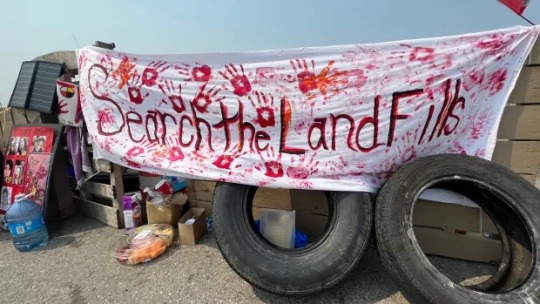
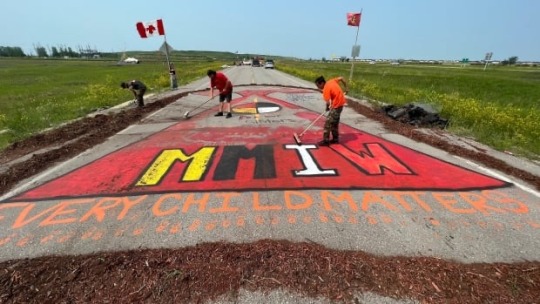

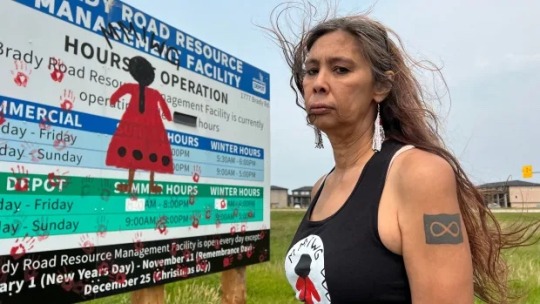
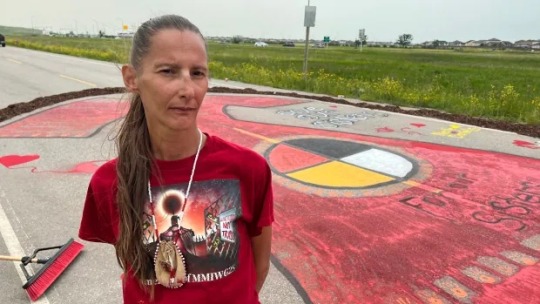
Protesters blocking the Brady Road landfill in south Winnipeg say their resolve is even stronger after a man shovelled a truckload of soil and debris onto an MMIWG mural near the blockade Sunday.
The blockade went up last week after the province refused to fund a search of Prairie Green landfill north of Winnipeg for the remains of two Indigenous women. The city ordered those blocking the roadway to vacate by noon Monday.
"Screw it. Who cares what they have to say? Who cares what they want? I'm not going to take no for an answer anymore," said Cambria Harris, whose mother's remains are believed to be at another landfill outside the city.
She said Camp Morgan — which has been at the Brady Road landfill since December— originally erected the blockade to "send a message," not to entirely block the landfill, which has two entrances.
But after the man's act on Sunday, she and others issued a call on social media for more "warriors" to join those on site, who said they're ready to keep rallying for change.
Harris said she wasn't at the blockade Sunday when the man in a black pickup truck dumped soil on the mural, but she saw the video of it happen, which she posted on social media.
In the video, the man is seen shovelling soil and debris from the back of his truck onto the mural, while telling protesters to "Take care of your own people." After someone responds [“we are, you fucking dumbass”], he asks, "Then why are they dead?"
Harris questions how he got past the security on site.
"Why are you so angry to feel like you have to take that extreme of a measure of a hate crime?" she asked.
"You don't realize that you're talking to an entire group of people who have been pulverized their entire life through systemic oppression."
"I'm outraged. I'm enraged. I'm infuriated," said supporter Melissa Morrisseau, who said she was at the landfill Sunday to help give a voice to missing and murdered Indigenous women and girls and their families.
"I'm here till the very end," she said.
Florance Smith was also there to take a stand with the families.
"They need to dig for our women," Smith said. "They just think that we belong in the garbage."
Harris said she believes the province's decision to not support a landfill search shows that the government doesn't care, and she now feels she's been disrespected by all three levels of government. She said it shouldn't have come to measures like the letter sent by the city, telling protesters to shut down the blockade.
"I've never ever understood it, why this kind of trauma is our fault," Harris said.
The mural, a red dress with the words "for our sisters" written on the skirt, was painted on the entrance road to the landfill, Ethan Boyer Way.
(…)
But after they realized the soil the man dumped contained cedar wood chippings, supporters decided to put them to use by sweeping the woodchips in a circle around the mural, she said.
"Cedar's our protection medicine, and we decided that we were going to include it into our art piece and circle her in protection," Bousquet said.
"We turned an ugly into a beautiful here. That's what our people are known for doing."
For Bousquet, it shows how resilient her community is.
"No matter what you throw on us … we're always going to create something beautiful," she said.
471 notes
·
View notes
Text

#Black Lives Still Fucking Matter#Black Lives Matter#LGBTQIA Community#Immigrant Lives Matter#Feminism#Disabled#Chronically ill#Mental Health#Autism#ADHD#Earth#Abuse Survivors#Kindness#Animal Rights#Indigenous Lives Matter#Indigenous
1K notes
·
View notes
Text
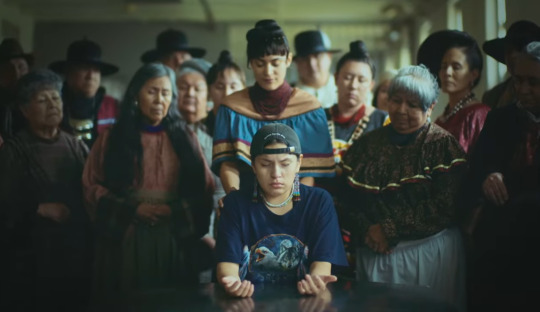
"They're all around you, all the time"
Reservation Dogs S2 E9 "Offerings"
#reservation dogs#rez dogs#dia de los muertos#day of the dead#willie jack#paulina alexis#ancestors#indigenous#ancestor worship#indigenous culture#mexican culture#indigenous lives matter#land back#lily gladstone
213 notes
·
View notes
Text
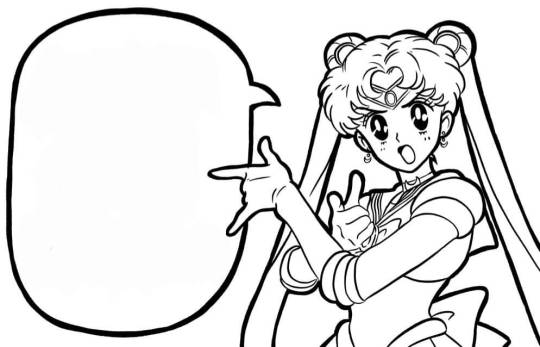
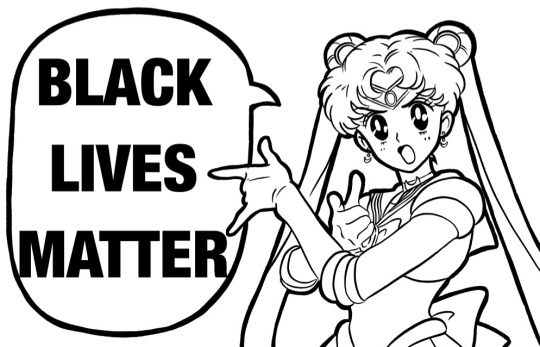
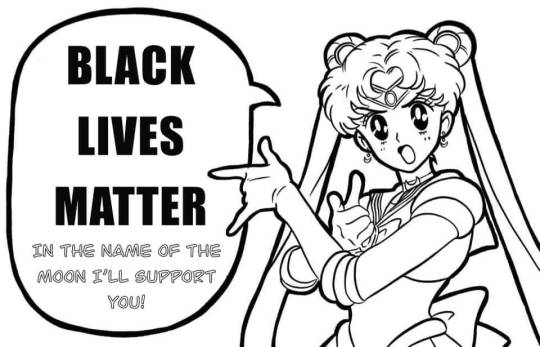
Stick to your rear windshield, your front door, your mailbox, wherever it needs to be seen. I didn't make the original blank template, so if you know who to credit that would be cool. Edit as you like to shout what social justice issue matters to you with the help of the OG SJW magical girl ✨️🌙✨️
#sailor moon#blm#black lives matter#social justice#sjw#social justice warrior#sailor moon says#protect black lives#sailor moon edit#meme#sailor moon meme#og sjw#shout your support#make it your own#blank template#trans lives matter#land back#indigenous lives matter#fight for justice#no justice no peace#you are on native land#say their names#abortion is a human right#keep abortion legal#abortion is healthcare#protect trans kids#protect trans rights#protect trans people#fuck colonialism#stonewall was a riot
284 notes
·
View notes
Text
Gather is an intimate portrait of the growing movement amongst Native Americans to reclaim their spiritual, political and cultural identities through food sovereignty, while battling the trauma of centuries of genocide.
Gather follows Nephi Craig, a chef from the White Mountain Apache Nation (Arizona), opening an indigenous café as a nutritional recovery clinic; Elsie Dubray, a young scientist from the Cheyenne River Sioux Nation (South Dakota), conducting landmark studies on bison; and the Ancestral Guard, a group of environmental activists from the Yurok Nation (Northern California), trying to save the Klamath river.
Please share!!

#please share#indigenous lives matter#indigenous#food sovereignty#activism#food#environmental justice#share share share#share#indigenous activism#nativeamericans#native plants#native women#repost this#film#documentary#films to watch#netflix#streaming now#thank you to the Allied Media Group in Detroit for hosting a screening#blaze it
209 notes
·
View notes
Text
Have a Heart Day 2024
This is a letter I wrote to the Canadian Government for Have a Heart Day 2024. I am asking the government to stop discriminating against First Nations children, to stop giving them inadequate services, education, and support, to stop treating them unequally compared to non-Indigenous children, and to stop taking them away from their loving families. I really hope that you read my letter and that you either copy paste it or write your own, and email the Canadian government yourself.
Hello. Our names are ____ and we are people from various parts of so-called Canada. We are writing to you to ask that you ensure the government stops discriminating against First Nations children, by signing a Final Settlement Agreement on Reform that meets and goes beyond the Agreement in Principle on Reform, and by following the Spirit Bear Plan and enshrining it into law.
First Nations children and families on reserves are being discriminated against in many ways. Most communities do not receive the same amount of and access to social services that non-Indigenous people receive. Most communities do not receive as good quality social services as non-Indigenous people. While there has been progress, Jordan's Principle, which is about meeting children's needs, is still not being properly applied. Most children don't have access to an equal quality of education as children off reserves, and many children receive very inadequate education services. And, very horrifyingly, children are being separated from families who love them and want to take care of them. This all needs to stop. We need to make, follow, and enforce laws that stop this discrimination.
First of all, let's talk about the fact that social services are inadequate on most reserves. As you know, the federal government funds services on reserves that the provincial or municipal governments fund elsewhere. The government generally funds services on reserves far less than services are funded off reserves. These include education, water infrastructure, housing, financial assistance, transportation, basic infrastructure, utilities, healthcare, mental healthcare, addiction support, job training, childcare, youth programs, cultural programs, recreation programs, libraries, child welfare, and more. These services are human rights and should be well-funded for everyone. It's not fair that non-Indigenous people have better services to better meet more of their fundamental human rights and basic needs while people on reserves don't.
The fact that people don't have access to the services they need is part of why there are high levels of poverty on reserves. Ongoing and historical racism, trauma, and discrimination have caused a lot of people on reserves to be poor. And this lack of services is part of that discrimination that is causing people to be poor. If people had the healthcare, education, housing, childcare, mental healthcare, addiction support, cultural support, job training, basic food and water, disability support, and other things they needed, they would be able to have the peace of mind, mental strength, knowledge, support, and resources necessary to pull themselves and their communities out of poverty. Also, since there is so much poverty on reserves, these communities need even more services to help meet their basic needs and human rights.
Services delivered need to be good and effective for the communities they are delivered in. This means that services need to meet each community's different needs. Because each community has different needs due to different connectivity to the outside world, poverty levels, local prices, etc. Service providers need to first see what services people need and how to best deliver them, then work out how much money is needed. Money should be the last thing considered. What each person, family, and community needs should be the first thing considered. And of course, services must all be culturally sensitive and relevant.
And part of why services are so low quality, as well as part of why so much discrimination and cruelty happens, is because Indigenous Services Canada has biases in its systems and people, and must be reformed. Indigenous Services Canada doesn't listen to experts about what communities need and how things should be done. They don't try to do their actual job, which is ensuring good services are provided to Indigenous people. They need to be reformed and communities need to lead their own service provision.
The Spirit Bear plan must be properly implemented and properly followed. It must be enshrined in law and the law must be completely enforced. The Spirit Bear Plan is the following:
"Spirit Bear calls on:
CANADA to immediately comply with all rulings by the Canadian Human Rights Tribunal ordering it to immediately cease its discriminatory funding of First Nations child and family services. The order further requires Canada to fully and properly implement Jordan's Principle (www.jordansprinciple.ca).
PARLIAMENT to ask the Parliamentary Budget Officer to publicly cost out the shortfalls in all federally funded public services provided to First Nations children, youth and families (education, health, water, child welfare, etc.) and propose solutions to fix it.
GOVERNMENT to consult with First Nations to co-create a holistic Spirit Bear Plan to end all of the inequalities (with dates and confirmed investments) in a short period of time sensitive to children's best interests, development and distinct community needs.
GOVERNMENT DEPARTMENTS providing services to First Nations children and families to undergo a thorough and independent 360° evaluation to identify any ongoing discriminatory ideologies, policies or practices and address them. These evaluation must be publicly available.
ALL PUBLIC SERVANTS including those at a senior level, to receive mandatory training to identify and address government ideology, policies and practices that fetter the implementation of the Truth and Reconciliation Commission's Calls to Action." This information is from the First Nations Child and Family Caring Society.
Another huge factor contributing to the inequality faced by many First Nations children is the fact that Jordan's Principle isn't being properly implemented.
The federal government, not the provincial government, typically pays for the services on reserves. But many times disputes arise about who should pay for a service, and the children don't get the services non-Indigenous children would get as a matter of course. Jordan's Principle is named after Jordan River Anderson, a young disabled boy from Norway House Cree Nation who passed away in the hospital after the provincial government and the federal government couldn't decide which one should pay the costs of his healthcare. The Principle states that if a First Nations child needs something for their well-being, they need to be given that service first and payment disputes should get addressed later. This includes medical, psychological, educational, cultural, disability, and basic needs support. Non-Indigenous children get these supports without having to ask because they have access to many more and better services. These supports are human rights that everyone deserves, especially children going through generational and contemporary trauma.
Jordan's Principle is not being properly implemented, and this is hurting kids. Though there has been much progress, Jordan's Principle requests, which are for things children need, are often denied, which goes against children's rights. Indigenous Services Canada, which runs the Jordan's Principle approval process, doesn't have an adequate complaints mechanism to hold to account its provision of the Principle. The government isn't making data available on whether they're meeting children's needs. Many children have delays in getting help, including time-sensitive medical, psychological, educational, and development help.
The application process, though easier than before, is still difficult and many families don't have adequate help and guidance through it. As well, most doctors don't know which children are eligible for Jordan's Principle supports, 40% don't know which services are covered, and ⅓ don't know how to access funding through it.
Long term reform is needed. An Agreement in Principle on long term reform has been drafted by the government and First Nations advocates, and it looks promising. It talks about increasing funding for Jordan's Principle services and trying to root out prejudice in the system. But the Agreement in Principle is not legally binding. It's not something the government has to follow, or is following, but rather what they claim they might do eventually. Negotiations for the creation of a Final Settlement Agreement based on the Agreement in Principle were underway but have been on standstill for months. A Final Settlement Agreement would be legally binding and would if done right increase the chances of achieving change.
The school system is also horribly unfair. Many First Nations schools on reserves get less funding than schools off reserve, with an average of 30% less funding per school. They don't have adequate funding for computers, software, technology, sports equipment, field trips, labs, lab equipment, extracurriculars, cultural learning, job training, and the list goes on. They don't even have enough money to have adequate heating, good quality infrastructure, adequate and safe ventilation, enough textbooks, and reasonable class sizes. Many schools don't have a safe and appropriate learning environment. All children, including First Nations children, deserve good education.
There is no clear plan to eliminate education and employment gaps.
The government claims it's negotiating with Indigenous groups but there's no evidence that they're actually doing anything to lower inequality. They also claim that they're funding education on reserves equally but all the evidence says they're not. You need to actually, genuinely fund education on reserves adequately and equitably, and make sure that children on reserves are actually receiving a good and equal and equitable quality of education.
A lot of communities don't have self-determination over their own education systems, meaning they can't teach about the history of their people and other important cultural knowledge. First Nations children need and deserve to learn about their culture, about the ecosystems their people are connected to and how to interact with those ecosystems, their history, their language, their traditions. And if communities have self-determination over their own education systems, and they have adequate resources and funding from the government, they'll be able to teach these things so that children grow up proud of who they are.
And what is perhaps the most horrible thing is that so many children are being separated from families who love them. This is the most traumatic thing that can happen to a child, and all children deserve and need to be with the families who love them.
At the height of residential schools, many children were separated from their families. Currently, 3 times as many children are in foster care, away from their families. One tenth of First Nations children have been in foster care. Children in foster care experience higher rates of physical and sexual abuse and do not get as much cultural immersion. Not to mention, even in the best circumstances, they're away from their families.
Most Indigenous children in foster care have loving families that try their best to take care of them, who they want and need deeply. But their families are poor or mentally ill or disabled, or have other factors that make it hard for them to meet their children's needs. Preventative support like financial, housing, health, and mental health aid could keep many families together. If child and family service agencies have the resources and the empathy to help families with what they need so that families stay together, that would be a great relief. Child and family service agencies need adequate money, infrastructure, and personnel to give families real help instead of taking children away. Most agencies do not have these. Programs that help the wider community such as healthcare, financial aid, housing services, mental healthcare, parenting classes, food support, community programs, youth programs, cultural programs, pregnancy support, and others would greatly decrease the number of children taken from their homes. Most communities do not have adequate levels of these programs.
Child and family service agencies need to be completely reformed, and should be led by First Nations communities themselves. Most child and family service agencies are not. This is especially important since there is bias against First Nations people in many agencies. Some communities are getting the opportunities to start their own child and family service agencies, but most communities do not have this opportunity. Canada needs binding laws to ensure child and family service agencies are led by First Nations communities and are based in the unique culture of each community, which they often aren't. Each community has unique needs depending on local prices, remoteness, poverty levels, and other factors. The way child and family services should be funded is by first seeing what services the children truly need, then seeing how to best deliver them, then determining how much money will be needed.
There is a promising Agreement in Principle on Reform, created by the government and First Nations advocates. It discusses increasing funding for child welfare services and trying to root out prejudice in the system. However this is not a legally binding agreement that the government has to follow. It's just something that they claim they'll maybe do in the future. A Final Settlement Agreement based on the Agreement in Principle would be legally binding. It would, if done right, enact more funding and reform. But negotiations for this have been on pause for months. Canada needs to implement evidence-based solutions to keep kids with their families. This means creating a legally binding and well-enforced Final Settlement Agreement on Reform that meets and goes beyond the Agreement in Principle on Reform.
Some communities are trying a new funding model for child and family services that may give more funding, allowing them to do more preventative services instead of taking children away. However, the results of this new funding model are not clear yet, and most communities do not have the opportunity to be funded by it. And there is no guarantee that the new funding model will be applied to all communities if it indeed does work. There is no guarantee that enough funding for prevention services will be given to all communities, whether or not the new funding model works.
The government often promises to create reform or adequately fund things, but they don't follow through on those promises. If the government does make progress, safeguards need to be in place to stop them from backsliding.
So here are our asks for you:
-Implement the Spirit Bear plan and adequately fund all social services on reserves.
-Make sure all services are available de facto just like they are off reserve.
-Fund cultural services and make sure all services are culturally-rooted.
-Eliminate all discrimination and bias in service providers.
-Listen to experts such as doctors and teachers, the community, and community-led service providers.
-Allow and help First Nations communities to lead their own social services rooted in their own cultural values.
-Keep funding flexible and adaptable to changing needs.
-Have adequate accountability measures for all service providers.
-Make a binding law to adequately fund all social services and have communities lead social service provision.
-Create a binding law to ensure that once you start adequately funding social services you don't stop.
-In a reasonable timeframe, reach a Final Settlement Agreement on Long-Term Reform that meets and goes beyond the Agreement in Principle.
-Make sure all Jordan's Principle requests in the best interests of children are accepted.
-Give presumptive approval for Jordan's Principle requests under $250.
-Support organizations and communities already providing Jordan's Principle services.
-Accept urgent requests within 12 hours and non urgent requests within 48 hours.
-Don't require more than one document from a professional or elder for making requests.
-Make data available on Jordan's Principle provision effectiveness.
-Make sure all supports are given in a timely manner without delays.
-Make it easy and convenient for families and professionals to make Jordan's Principle requests.
-Fund schools on reserves as much as schools off reserve. This includes funding for computers, libraries, software, teacher training, special education, education research, language programs, cultural programs, mental health support, support for kids with special needs, extracurriculars, ventilation, heating, mold removal, vocation training for students, and more.
-Make sure all schools have the resources, funding, and support necessary to teach culture.
-Make a clear joint strategy to eliminate the education and employment gap.
-Make sure all school staff are non-discriminatory.
-Make sure communities have self-determination to create culturally rooted education.
-Adequately fund child and family services on reserves, and make sure they can hire enough people and have good infrastructure.
-Stop discrimination within child and family service agencies.
-Allow and help all First Nations communities to lead and run their own child and family service agencies that are based on their cultural values.
-Enact evidence based solutions to keep families together.
-Don't take children from families that love them.
-Have and fund adequate preventative services so families can take care of their children and no child is taken away.
-Keep funding for child and family services flexible and responsive to each community's needs, and listen to communities to learn what their needs are.
-Have adequate accountability in child and family services so that any underfunding, discrimination, or failure is stopped and remedied.
-Family support needs to start at or even before pregnancy.
-Fund culturally-based healing of people who have been harmed and are being harmed by the government's discrimination.
———
Find your MP here: https://www.ourcommons.ca/en/members
justin.trudeau(at)parl.gc.ca- Prime Minister Trudeau
chrystia.freeland(at)parl.gc.ca- Deputy Prime Minister Freeland
patty.hajdu(at)parl.gc.ca- Minister of Indigenous Services
gary.anand(at)parl.gc.ca - Minister of Crown-Indigenous Relations
#canadian#canada#canadian politics#cdnpoli#indigenous lives matter#indigenous rights#indigenous sovereignty#every child matters#bipoc lives matter#discrimination#racism#oppression#social juatice#child rights#children’s rights#social issues#inequality#injustice#family#community#childhood#childhood trauma#trauma#family separation#separation#hurt#pain#saddness#letter#action
47 notes
·
View notes
Text
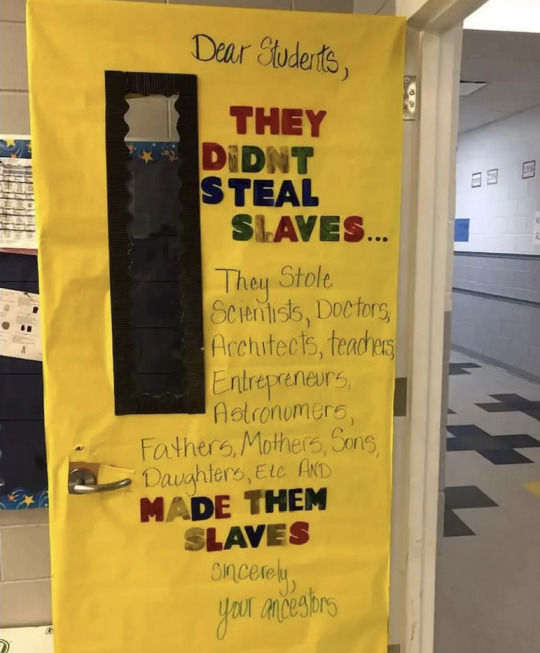
1K notes
·
View notes
Text
instagram
#nobody’s free until everybody is free#palestine#free palestine#from the river to the sea palestine will be free#free gaza#gaza#west bank#the west bank#settler colonialism#genocide#education is important#media#corruption#black lives matter#solidarity#indigenous people#indigenous rights#indigenous lives matter#indigenous voices#we have to keep fighting#we have to stand together in solidarity with all oppressed people#keep protesting#keep the pressure on#keep spreading the word#Instagram
57 notes
·
View notes
Text
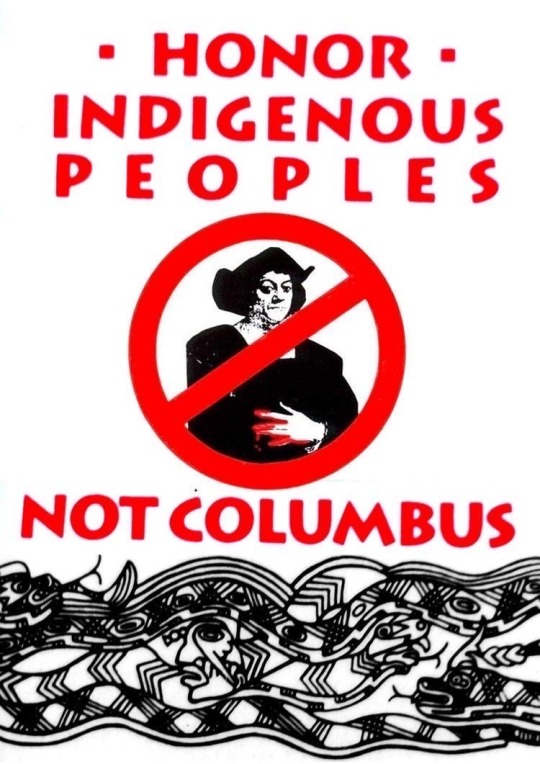
fuck him.
#columbus is an asshole#indigenous lives matter#honor indigenous lives#fuck columbus#fuck colonizers
164 notes
·
View notes
Text
I hope you get to play lots of Minecraft, wherever you are now
All your favorite foods
Perfect Internet connection
Lots of warm hugs and cuddles and kitties
All your favorite stuff
😭
18 notes
·
View notes
Text
On May 19, 2023, 19 year-old Virgilio Aguilar Mendez was sitting outside of the hotel he was staying at when Sgt. Michael Kunovich, an officer with the St. Johns County Sheriff's Office in St. Augustine, Florida, approached him.
Kunovich called dispatch describing the teen as a "suspicious Hispanic male". The officer then asked Aguilar Mendez if he had any weapons before grabbing his arm while the teen repeatedly said 'no', that he was sorry and that he was just eating. Aguilar Mendez was an immigrant who couldn't speak English and can be seen in the bodycam footage repeatedly trying to tell the officer this.
The officers then grabbed his arm and asked if he had any weapons on his person but when Aguilar Mendez tried to walk away, they pinned the 5'4 teen to the ground, putting him in a chokehold, and tasing him several times.
Officer Kunovich would then suffer a heart attack, dying in a nearby hospital. St. John’s County prosecutors then filed charges against Aguilar Mendez for aggravated manslaughter of an officer and resisting an officer with violence despite the fact that Officer Kunovich had a long history of heart and lung problems prior to the arrest.
#police brutality tw#social justice#virgilio aguilar mendez#indigenous lives matter#important#current events
16 notes
·
View notes
Text
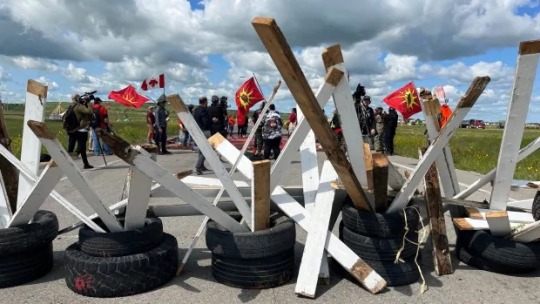
Dozens of people outside Winnipeg's Brady Road landfill have built barricades and are signalling their unwillingness to leave, despite a noon deadline from the city to vacate the area and the possibility of legal action.
Cambria Harris, whose mother's remains are believed to be in the Prairie Green landfill north of Winnipeg, is one of the people who called for the blockade to be erected and for others to join the demonstration at the Brady Road landfill.
The blockade of the city-run Brady Road landfill began Thursday after Manitoba Premier Heather Stefanson said the province would not support a search of the privately owned Prairie Green Landfill north of the city, where the remains of Morgan Harris and Marcedes Myran were believed to have been dumped last year.
"When you say you won't move forward with the search, you're telling my community that it's OK and that you condone the continuous dumping of Indigenous women," Harris said in an interview on Monday.
(…)
Harris's aunt, Melissa Robinson, said what's happening is not acceptable.
"We're talking about our women laying in landfills. You don't put a dollar on that — absolutely not. I don't care if it costs $200 million, $300 million, they need to go and get them. I'm not going to have my nieces go sit at a landfill to visit their mom for the rest of eternity. It's wrong."
(…)
Some members of the group of demonstrators at the dump moved to the Leaf — a conservatory in Assiniboine Park, where Manitoba's premier is hosting officials from seven provinces — on Monday afternoon.
Carrying drums and a megaphone, the people named missing women and chanted, "We are not trash," while demanding Stefanson reverse her decision.
After speeches were made by members of the group, they left peacefully.
The remains of Sue Caribou's niece, Tanya Nepinak, are believed to have been dumped at the Brady Road landfill in 2011, but none were found following a six-day search by police.
Caribou wants to see all landfills searched for the remains of missing Indigenous women.
"We want our loved ones home. We want closure," she said.
"No human being belongs in the trash."

269 notes
·
View notes
Text
This country was stolen from Indigenous people, and built on the backs of slaves.
Denying that history is absolutely disgusting. So many suffered. You can deny it all you like. But it doesn't erase the pain or the history.
197 notes
·
View notes
Text

Reservation Dogs 3.03 "Deer Lady"
This episode was a real gut punch.
#reservation dogs#rez dogs#boarding school#deer lady#indigenous lives matter#mmiw#native american#indigenous representation#missing and murdered indigenous women#indigenous history#taika waititi#sterlin harjo#d'pharaoh woon a tai#bear smallhill#native american boarding schools#native boarding school#indigenous boarding school#american indian boarding schools
183 notes
·
View notes
Text
In Britain, November is an early start for Christmas.
In America, November is Thanksgiving month which is the month of mourning for the indigenous people of America.
Is Thanksgiving a time for family, food, Maceys Parade and football?
Of course!
But, it has an ugly side nobody talks about. About how Thanksgiving is about the white Pilgrims fleeing Britain and stealing the land of the indigenous Americans and forcing them to convert to their God!
So, just remember that November is the month of mourning for the indigenous people of America.
#Thanksgiving#indigenous lives matter#Indigenous people#November#Month of mourning#missing and murdered indigenous women#Indigenous#White guilt#socialism#Left wing
36 notes
·
View notes